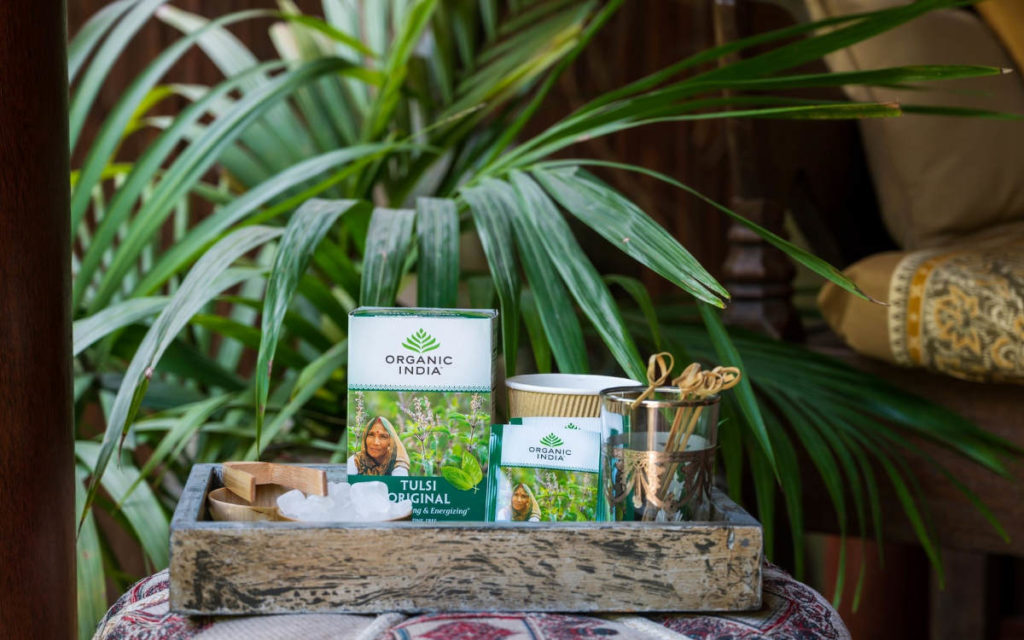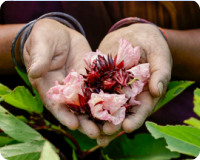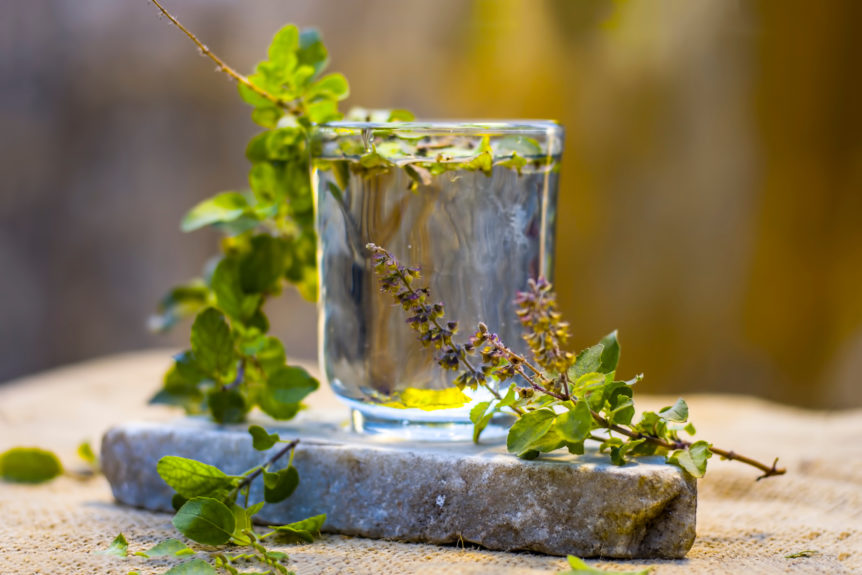

Section

Back
Tulsi, or Holy Basil, is an aromatic Ayurvedic herb that beholds deep health benefits for both the body and mind. Tulsi is so versatile in its powers that Indians have long considered the plant sacred. In fact, it is known as Holy Basil because it is regarded as a living manifestation of the divine within the plant kingdom. Tulsi, the queen of the Ayurvedic landscape, is known as the Incomparable One for its ability to grant health and renewal. Nature has imbued the humble Tulsi leaf with a cornucopia of beneficial qualities that have been recognized for more than 5,000 years and now verified by modern science. This adaptogenic herb is increasingly popular in the West for its ability to relax the mind and protect the body.
Types of Tulsi
There are actually 108 types of Holy Basil, but there are three most commonly cultivated for their therapeutic quality. Rama, Vana and Krishna Tulsi all complement each other in both flavor and benefit. Being a part of the Basil family, the aroma ranges from earthy, floral and astringent to bright, lemony and peppery.
- Rama Tulsi (Ocimum sanctum). Rama Tulsi (also known as Green Leaf Tulsi), a broader Holy Basil leaf variety, is found in parts of China, Nepal, India, and southern South America. It promotes healthy digestion, and though its flavor tends toward the mild, its scent becomes stronger when the leaves are crushed.
- Krishna Tulsi (Ocimum sanctum). Krishna Tulsi is characterized by its purple leaf and grows in areas throughout India, but remains harder to find than the greener variety. Krishna Tulsi (also known as Shyama Tulsi or Purple Leaf Tulsi) has gained a reputation for addressing respiratory infections, ear infections, and skin problems. This slow-growing plant features a spicy, pungent flavor and odor with a less bitter taste.
- Vana Tulsi (Ocimum gratissimum). Lastly, there is Vana Tulsi, also known as Wild forest holy basil. This variety is the most difficult to find, as it grows around the foothills of the Himalayas. This type is considered the tastiest and most beneficial of the Tulsi herb family, and it features light green upper leaves and dark green lower leaves.
ORGANIC INDIA’s Tulsi teas and supplements contain an Organic, Fairtrade proprietary blend of all three types for the greatest balance of uplifting flavor and deep benefits.
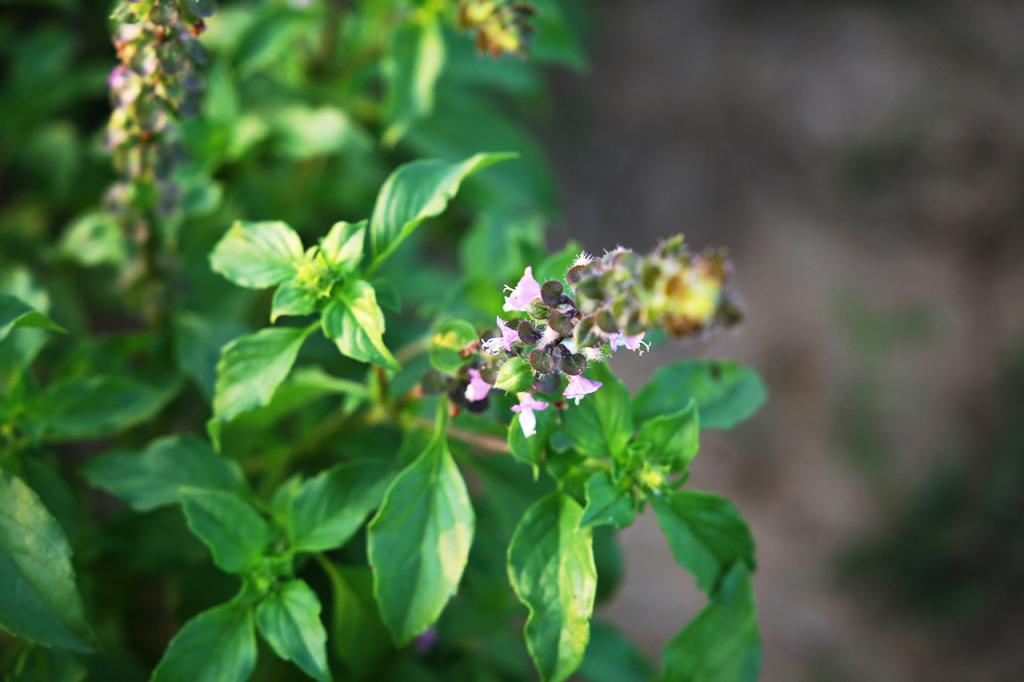
Spiritual Significance of Tulsi
Due to its mind, body and spirit benefits, Tulsi has long been a subject of myth, ritual and religious belief.
The ancient Vedic Bhagavata Purana text hails Tulsi as the plant embodiment of Lakshmi, wife of Vishnu and the goddess of wealth and generosity. India’s Daily Hunt online explained that Tulsi is hailed as the threshold between heaven and earth and is said to hold Brahma in its branches, the Hindu centers of pilgrimage within its roots; the holy river Ganga flowing through its roots; all the other deities in its stem and leaves; and the holy scriptures, the Vedas, in the tips of the plant.
In Hinduism, Tulsi is hailed as the threshold between heaven and earth.
In one of India’s most enduring myths, the herb is related to the Samudra Manthan, which Tamil writer M.D. Muthukumaraswamy explains when the tumultuous churning is over and things begin to settle, Dhanvantari, the physician to the gods, rises victoriously out of the ocean. In his hands, he holds the elixir of immortality and makes an offering to Vishnu, who is overcome with tears of happiness. As he receives the gift, Vishnu’s first tear falls into the drink from which the Tulsi plant sprouts.
To this day, in a ritual called Tulasi, Vivaha people witness the ceremonial marriage of the adaptogenic herb to the Hindu god Vishnu, or to his avatar Sri Krishna. This ancient wedding brings Hindus to the end of the monsoon season and the beginning of the wedding season.
Benefits of Tulsi
The benefits of Tulsi positively impact the whole human entity, including the spirit, and the breadth of its replenishing capacity is truly remarkable. Here are the top benefits:
- Stress-Relieving. Tulsi is an adaptogen that has been used for thousands of years to relieve stress and promote inner peace.
- Uplifting. Holy Basil is sometimes referred to as “liquid yoga” for its ability to help uplift mood and bring a sense of calm clarity.
- Immune-Supporting. Known as an immunomodulator, Tulsi can help support healthy immune function year-round.
- Detoxifying. Helps support the body’s natural detoxification process.
- Respiratory Support. Can help support normal breathing and clear congestion in the chest.
- Heart Health. Helps support cardiovascular health, blood pressure and normal heart rate.
- Clear Skin. When applied topically, Tulsi can help soothe and clear the skin while preserving youthful appearance.
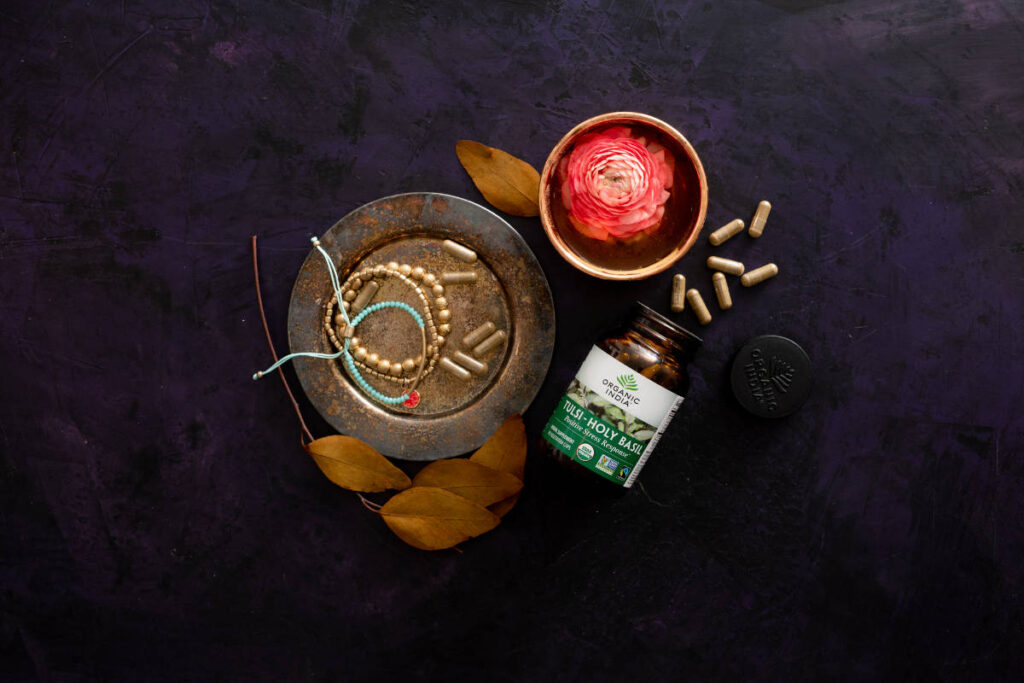
Tulsi’s Bioactive Compounds and Energetic Qualities
Over the past several decades, modern science has confirmed the chemical source of many of Tulsi’s health-promoting properties, though the plant’s spiritual qualities remain beyond the capacity of scientific understanding.
Bioactive Compounds. Among the well-researched, beneficial constituents of Holy Basil are eugenol (a volatile oil), ursolic acid (a triterpenoid), and rosemarinic acid (a phenylpropanoid). Other active compounds include caryophyllene and oleanolic acid, carotenoids, vitamin C, calcium, iron, zinc, and chlorophyll.
Energetic Qualities. Holy Basil is a plant that is ritualistically used to purify the household, temples, and shrines. It has found its rightful, prominent place in homes across India because pure energy — the essence of consciousness — is the giver of life. Donnie Yance, founder of Oregon’s Mederi Center, reported, “Holy basil modulates the stress response, increases adaptive energy, and specifically elevates and nourishes the ‘Vital Spirit.’ Like ashwagandha (another traditional Ayurvedic adaptogen) and eleuthero, holy basil is well suited for all energetic types.”
Tulsi’s Role According to the Doshas
Ayurvedic practitioners use Tulsi as part of a complete program that takes into consideration the patient’s specific dosha profile. Doshas are a person’s Ayurvedic mind-body type, and there are three main categories: Vata, Pitta, and Kapha, each of which is derived from the five elements.
Meditation and yoga instructor Melissa Eisler writes that the herb carries the bitter, pungent, and astringent tastes, and generates a warming influence on the physiology. The plant is predominantly Kapha-reducing, but it can also be used to pacify Vata and Pitta. It can, however, have a mildly Pitta-aggravating effect on people who are severely overheated. For excess Vata, Ginger and Tulsi herbal tea helps support the lungs and immune system while warming the body.
One’s dominant dosha reflects the dominant force in the overall mind-body makeup. Secondary and least dominant doshas also play a role in one’s mind-body physiology. The practice of Ayurveda takes into consideration which doshas are out of balance, and from this perspective provides treatment programs to bring the patient back into balance through meditation, herbs, dietary foods, breathing techniques, mantras, and other means. So, when considering what herb is good for stress, look to Tulsi and other herbs used in Ayurveda.
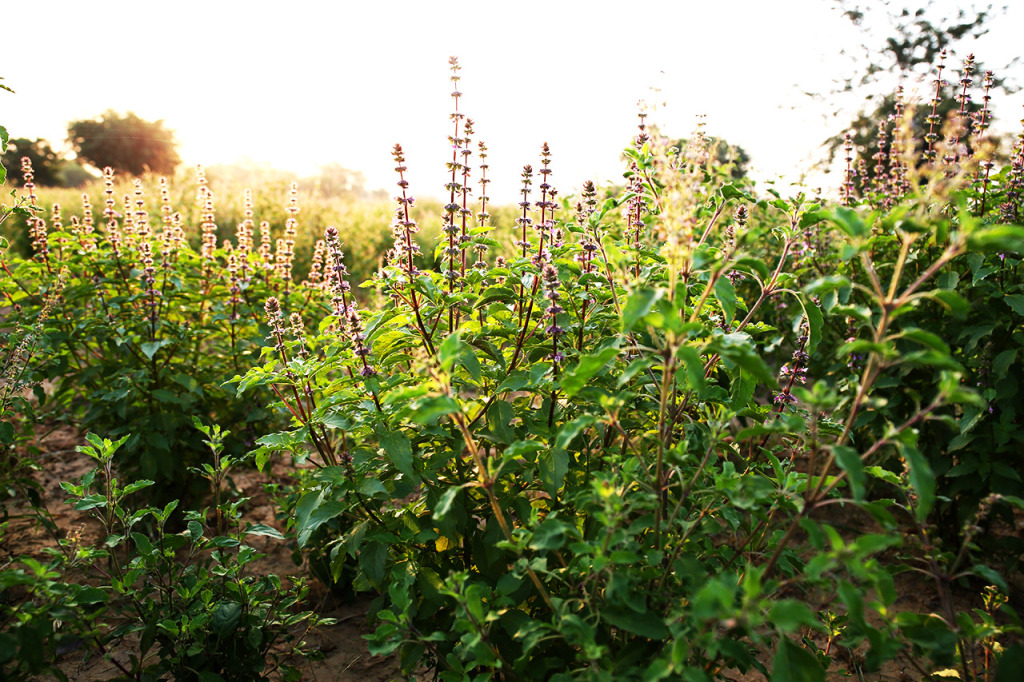
What is Tulsi Tea?
Tulsi herbal tea is made similarly to other teas, by pouring hot water over the leaves and then adding a natural sweetener if that is desired. As with all plants, it is important that it is grown with the utmost care in terms of being organic, and environmentally harmonious. Farmers who grow plants as a labor of love offer the best yields from an energetic and healthful perspective. Tulsi tea has an herbal, bright and earthy flavor with notes of lemon and pepper.
What is a Tulsi Supplement?
Tulsi supplements are a convenient way to get all of the deep benefits of Holy Basil as part of your morning wellness ritual. Organic India Tulsi supplements feature a vegan capsule with 900 mg of whole organic, Fairtrade Tulsi inside. You can take it alongside your vitamins for a dose of balance, relaxation and mood support throughout your entire day. The capsules also easily pull apart, so you can also sprinkle the leaf in smoothies, oats and juice if preferred. It’s a natural way to bring the body and mind back to harmony and root yourself in the ancient spirit of wellness.
Organic India’s Tulsi is the result of a profound integration of the earth, human care, and the spirit of wholeness. Like every other adaptogenic herb that it offers, the company’s Tulsi is the result of environmental stewardship beyond “sustainable” – incorporating biodynamic, regenerative farming practices. It is important to reflect upon a company’s purpose and commitment, because this energy goes into its products, and ultimately into your body. Holy Basil is a holy, sacred plant that deserves special treatment and respect.
